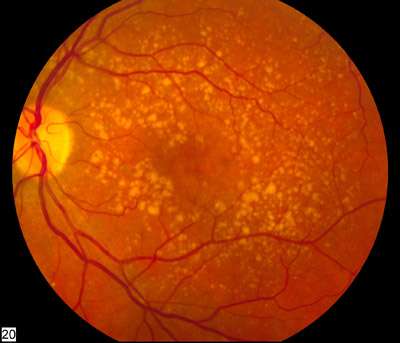Picture of the back of the eye showing intermediate age-related macular degeneration. Credit: National Eye Institute
An international team of researchers has found via clinical trial that the drug pegcetacoplan may slow the onset of age-related macular degeneration in some people. In their paper published in JAMA Ophthalmology, the group describes the outcome of a clinical trial on the effectiveness of the drug pegcetacoplan administered to patients with genetically predisposition to macular degeneration before symptoms begin. Hendrik Scholl, with the Institute of Molecular and Clinical Ophthalmology Basel, published an Invited Commentary in the same journal issue outlining the work done by the team on this new effort.
Macular degeneration is the deterioration of the macula, a central part of the retina at the back of the eye, which results in loss of vision. The condition is quite common in older people; more than 3 million people are diagnosed each year. Macular degeneration has a genetic component, some people are far more likely to experience it than others. Prior research has also led to the development of drugs to slow the deterioration of the macula. One such drug is pegcetacoplan, which is more commonly known as Empaveli. In this new effort, the researchers wanted to know if giving the drug to people who are likely to experience macular degeneration could slow its onset, thus preserving eyesight. To find out, they conducted a clinical trial involving 167 patients.
The clinical trial ran for a year, with participants being measured regularly for retinal pigment epithelium and outer retinal atrophy. The drug was administered monthly for some participants and every other month for others, and a third group received a placebo.
The researchers found that giving the drug to people predisposed to macular degeneration did, in some cases, delay the onset of the disease. More specifically, they found that progression to atrophy was slowest in the group receiving the drug every month, and the next slowest was in those who received the drug every other month. Those who received a placebo, quite naturally, progressed at the rate expected for untreated people.
The researchers suggest that pegcetacoplan represents "a strong therapeutic candidate" for slowing the onset of macular degeneration in some patients.
More information: Muneeswar Gupta Nittala et al, Association of Pegcetacoplan With Progression of Incomplete Retinal Pigment Epithelium and Outer Retinal Atrophy in Age-Related Macular Degeneration, JAMA Ophthalmology (2022). DOI: 10.1001/jamaophthalmol.2021.6067
Hendrik P. N. Scholl, Complement Inhibition in Age-Related Macular Degeneration—Treat Early!, JAMA Ophthalmology (2022). DOI: 10.1001/jamaophthalmol.2021.6068
Journal information: JAMA Ophthalmology
© 2022 Science X Network























